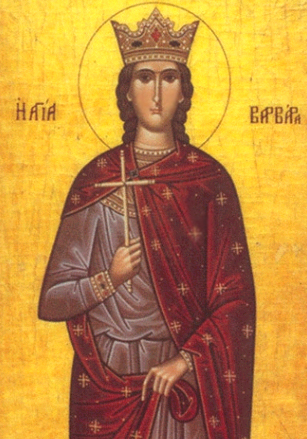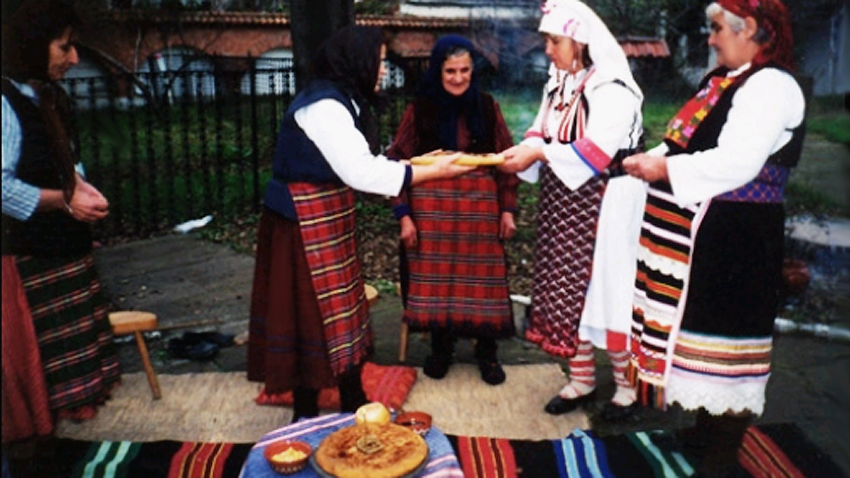 Great Martyr Barbara was born at the end of 3rd c. She died a martyr’s death for the Christian faith in the early 4th c. As a girl Barbara was a rare beauty and her father locked her up in a stone tower to ward off men’s lustful eyes. Her family was pagan but noble. When he decided to let his daughter live freely and find a husband, she met Christians and was converted to Christianity. This made her father angry and he issued orders for her torturing. She refused to give up her faith and he went on with an order for beheading her.
Great Martyr Barbara was born at the end of 3rd c. She died a martyr’s death for the Christian faith in the early 4th c. As a girl Barbara was a rare beauty and her father locked her up in a stone tower to ward off men’s lustful eyes. Her family was pagan but noble. When he decided to let his daughter live freely and find a husband, she met Christians and was converted to Christianity. This made her father angry and he issued orders for her torturing. She refused to give up her faith and he went on with an order for beheading her.
According to most sources the execution was carried out on 4 December. This is the day on which both Orthodox Christians and Catholics commemorate St. Barbara as protector of those who died sudden deaths and did not have time to repent and receive the sacrament.
In the Bulgarian tradition Barbara is the protector of children from disease, above all from measles. The feast is known as Varvara, Varvaritsa, Varvarinden, Varvardan.
On St. Barbara’s Feast women make fresh round loaves with honey, and give them away to strangers. Children too, perform a special ritual for health. Early in the morning they gather together and make a fire. They gather in groups of three, five or seven, in any case an odd number. Each of them carries firewood and several handfuls of beans that are boiled in anearthen pot. Before adding salt and onions, beans are removed from the pot and three beans are placed on the knee of every child. The child performing this ritual should be the youngest in his or her family. Then every child should eat the beans from their knees without using their hands. Villagers who have herds go to the children and take away some beans to put them into the sheep feed – a proven way to ward off disease, and especially measles.
It was believed that from St. Barbara to St. Ignatius (20 December) the day would increase by a needle top and from St. Ignatius to the St. Basil the day would grow as much as the rooster could jump from the threshold. In folklore, the day lasts as long as the night on St. Barbara.

St. Barbara’s Feast is honored during the Nativity fast, so the menu on 4 December should be vegan. In folk notions St. Barbara is the sister of St. Sava (the feast is on 5 December) and of St. Nicholas (6 December). Hence the proverb: Barbara boils, Sava bakes, Nicholas comes with the big ladleand welcomes guests.
There is a legend according to which St. Barbara was born in the present-day Bulgarian lands – in the southwestern village of Eleshnitsa whose old name was Iliopolis. When Barbara was beheaded mineral water gushed out from the point where her blood was absorbed by the soil. The place is still remembered today and is called Miroto (The Holy Oil). This legend was recounted in the writings of a Russian monk from Mount Athos who went to Eleshnitsa for mineral water treatment.
On December 4 a holy liturgy is served in Orthodox churches across Bulgaria to commemorate the Great Martyr with a prayer. A few months ahead of the Feast clerics write down the names of all Christians who wish to be mentioned during the prayer to St. Barbara.
English Daniela Konstantinova
One of the three biggest Hebrew holidays, Pesach (Passover) starts at sundown (5 PM) on 22 April and ends on 30 April. It is a movable feast, falling after the 14 th day of the spring month of Nisan which starts after the spring equinox with the..
The founder of the Internal Revolutionary Organisation for the Liberation of Bulgaria, Vasil Levski, was the first to involve foreigners in the liberation movement when he set up revolutionary committees in the Bulgarian provinces. The first foreign..
"Man does not know the way to heaven, but the horse does," says an ancient Thracian proverb. That is why the Thracian kings were necessarily sent to the afterlife together with their horses. Because of the numerous burial mounds of rulers from the..
One of the three biggest Hebrew holidays, Pesach (Passover) starts at sundown (5 PM) on 22 April and ends on 30 April. It is a movable feast, falling..
The founder of the Internal Revolutionary Organisation for the Liberation of Bulgaria, Vasil Levski, was the first to involve foreigners in the liberation..

+359 2 9336 661
